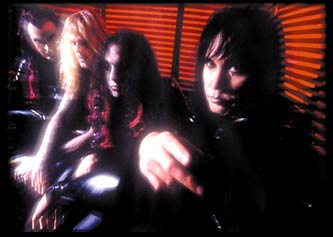
1999 OFFICIAL BIOGRAPHY

With only months left before the end of the world, the beast known as W.A.S.P. is back. With the release of 'Helldorado', the four-piece killing machine of vocalist/guitarist Blackie Lawless, lead guitarist Chris Holmes, bassist Mike Duda and drummer Stet Howland prove that the spirit of sonic, in-your-face, sleazy rock 'n' roll is more than just alive and well. It's spitting blood and taking names!
Throughout their storied career, W.A.S.P. have never been a band that's been afraid to take risks. Their early recordings, like their self-titled debut and 'The Last Command', ignited the war over censorship and album stickering while the politically-charged 'Headless Children' and the conceptual 'Crimson Idol' revealed that behind all the controversy was a rock 'n' roll band of substance. W.A.S.P.'s 1997 release, 'K.F.D.', was the band's darkest effort and the world tour supporting 'K.F.D.' was considered downright blasphemous by some.
The May 1999 release of 'Helldorado' is an unabashed return to W.A.S.P.'s early sound of sex, blood, and rock 'n' roll.
"You know when you're walking down the street and you see an old girlfriend and she's looking pretty good, you're like, 'Hey, why ain't I fucking you anymore?" asks W.A.S.P.'s founder and mainstay, Blackie Lawless. "You know what I mean? You miss it. When we did 'Double Live Assassins', it re-introduced us to the sound and style of our first two albums. Now I'm kinda like 'How did we get away from this style, this attitude?"
"The mood that you're in when you make a record is reflective of who you are at that time. When you look at how dark 'K.F.D.' was and then you look at the frame of mind Chris and I were in when we first got back together in late '95, there was like a shroud of hostility around us. By the time we did the live album, we didn't feel like that anymore. Once we got the whole 'K.F.D.' thing out of our systems, it was like, 'Okay we've done that, now what do we feel like doing?"
Blackie originally started writing 'Helldorado' before Christmas of '97 but admits he got really serious about it around June or July '98. With Blackie producing, W.A.S.P. started recording in Los Angeles in November 1998 and finished at the end of February 1999.
"I don't like making records back to back that sound the same," explains Blackie. "Because of that I'm hard to pin down and unpredictable. I'm sure that has hurt me, but I've been lucky enough to sell enough records to keep me floating. I've got a dedicated fan base that's enabled me to have the flexibility to experiment. Historically, W.A.S.P. have always made records that reflect what we were thinking at the time. This album was a challenge, because I didn't know if I could write like this anymore."
Not only did Blackie rise to the occasion, he penned what in all likelihood will be remembered as one of 1999's raunchiest and rowdiest albums. No fancy frills, no distractions; 'Helldorado' is rock 'n' roll the way it was meant to be - hard!
"This record has a very deliberate intention and that's to do the type of songs we used to do before we had a record deal," explains Blackie as he puts the final touches on the album. 'Helldorado' is probably closer in vein to our original demo than anything we've done to date. When a band starts out they take the approach that they're not going to do anything in the studio that they can't do live. After a band has an album or two or three under their belts, a producer will suggest, 'Let's do this and let's do that.' Eventually most bands will give in to the idea of what you can do in the studio versus what you can do live. The logic goes from 'No, we can't do that live so we won't want to do it all the way' to 'Okay, let's do this for the record and then we'll figure out what to do live later.' 'Helldorado' was written with the mentality of 'if we can't do this naturally with two guitars, bass and drums, then it's not going to go on this album.' By that direction, it puts you in a space where the writing becomes less technical and the songs have a characteristic all their own."
"This ain't no joy ride. Do you wanna go? The tank is never empty. It keeps it filled with souls." - an excerpt from the title track of 'Helldorado'. The song "Helldorado" warns of a Cadillac from Hell. Demon-possessed machinery, and Blackie admits that this song is the closest thing to "Blind In Texas" that he's written in years. During the writing of 'Helldorado', songs like "High On the Flames", "Can't Die Tonight", and "Hot Rods To Hell" started taking a direction of their own and as a songwriter, Blackie doesn't fight those things when they happen.
"There's nothing on this record that's overtly serious," admits Blackie. "This is not a thinking man's record. It's a go out and get fucked up on a Saturday night type album. This album is like "Mean Man", "Blind In Texas", and "Animal" all rolled up in one. I mean, what are you gonna say when you've got a song called "Dirty Balls"? That's pretty much the frame of mind that everybody's in. There's no deep, dark, or political message to 'Helldorado' and we haven't done a record like this since the first W.A.S.P. album. I will tell you this, it's the kind of record that when people hear it, the only thing that's gonna happen is you'll see a big, broad grin on their faces!"